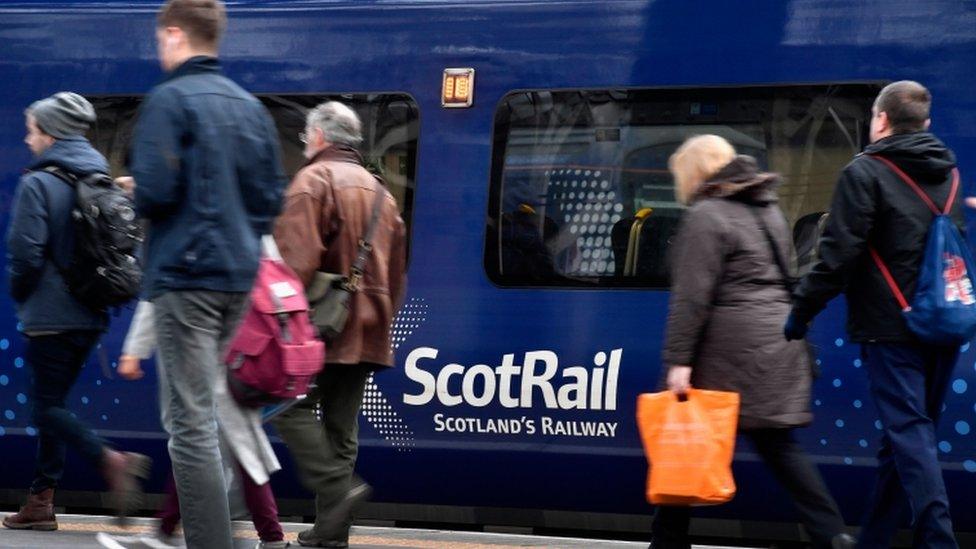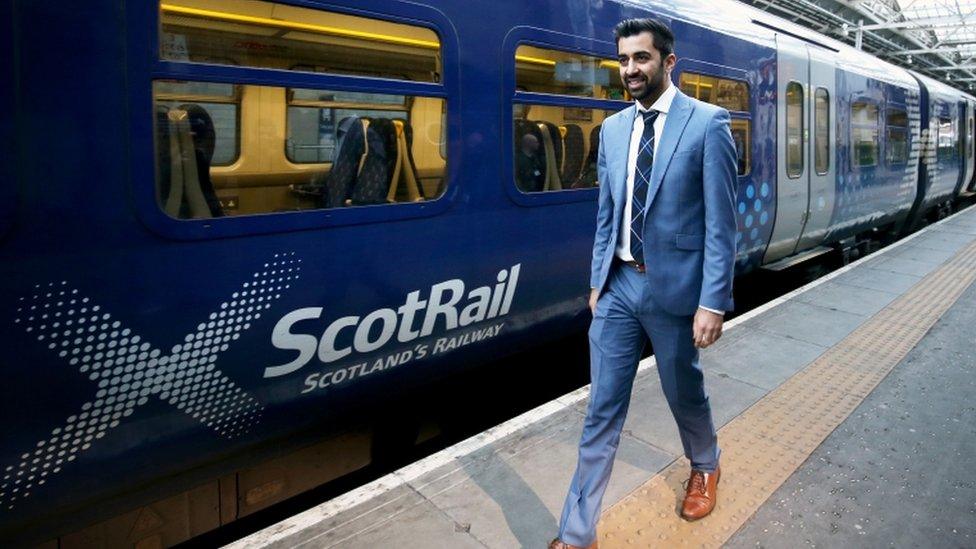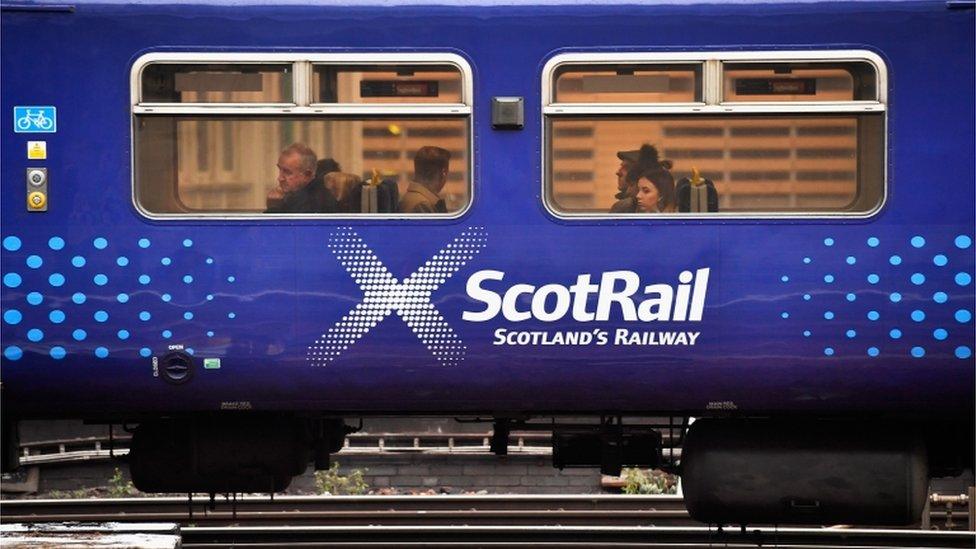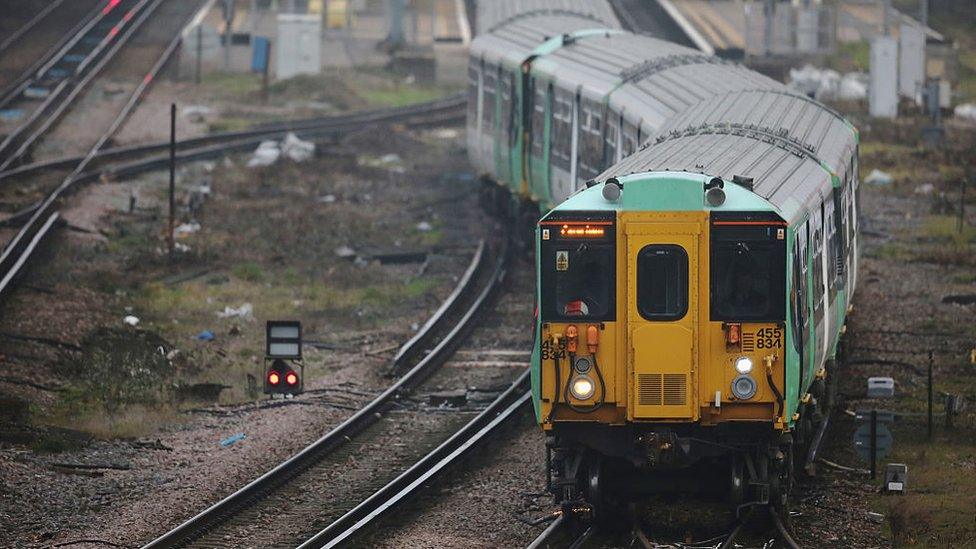ScotRail passenger satisfaction increases to 90%
- Published
- comments

The independent survey contacted more than 1,200 ScotRail passengers across the country
Passenger satisfaction with ScotRail services has increased, an independent survey of train users has found.
The nationwide study by watchdog group Transport Focus found 90% of passengers were satisfied overall with ScotRail services, compared with 83% previously.
The group spoke to more than 1,200 commuters, business and leisure travellers across Scotland.
There were increased ratings for journey times and train frequency, but satisfaction with value for money fell.
ScotRail managing director Alex Hynes said the 90% score "equals our best ever result", saying the firm was building "the best railway Scotland has ever had".
Transport Secretary Humza Yousaf said the scores were 7% higher than the average for firms across the UK, posting "huge thanks to all ScotRail staff who've worked tirelessly to achieve this" on Twitter.
Mr Yousaf has previously discussed the possibility of setting up a public sector train operator, during a period of criticism after Dutch firm Abellio took over the franchise in April 2015.
'Really encouraging'
The latest data shows an improvement in satisfaction with services in the Strathclyde area in particular, up from 87% to 92%. The scores for urban routes were also up, from 85% to 83%, but those of rural routes fell from 89% to 86%.
Satisfaction with journey length increased to 92%, and ratings for the frequency of trains on routes went up to 86%. Scores for value for money and how well the firm dealt with delays were lower, at 61% and 54%, but both showed improvement on previous surveys.
Scores for personal security on board services fell to 79%, and results for station car parking and ticket-buying facilities also fell.

Transport Minister Humza Yousaf tweeted congratulations to ScotRail staff
Mr Hynes, who took over as managing director earlier in 2017 following the departure of Phil Verster, said the results were particularly pleasing given the amount of upgrade work ongoing on the rail network.
He said: "For nine out of 10 ScotRail customers to be satisfied with our performance at a time when we are delivering one of the biggest upgrades to our network since Victorian times is down to the hard work of our dedicated staff at the ScotRail Alliance.
"These results are really encouraging, but we aren't complacent. The major investment we are making now will mean faster journeys, more seats and better services for our customers."
Among other routes including stations north of the border, Virgin East Coast's Scottish routes scored 91% while satisfaction with the TransPennine Express services to Glasgow and Edinburgh fell from 90% to 85%.
Across the UK, the best scores were recorded at Hull Trains and Heathrow Trains, at 97%, while the lowest scores were for Southern Rail at 72%.
'Continued action'
Opposition parties welcomed the improved scores, but highlighted some areas of concern.
Scottish Conservative transport spokesman Jamie Greene said it was important to acknowledge the efforts of ScotRail staff in achieving the latest improvements, but said there were "still several areas of concern".
He added: "It's deeply concerning to see that there are many more passengers who do not feel safe on board trains, and with many also criticising the car parking and ticket-buying facilities at stations, it shows that there is still a lot of work to be done.
"We need to see continued efforts from ScotRail and the SNP government if we are to see Scottish passengers given the train service they deserve."
Scottish Labour's Neil Bibby said it was "good to see overall passenger satisfaction increasing", and thanked railway workers.
However, he added that "passengers will still want to see continued action to tackle overcrowding and improve ScotRail services", and noted that nearly 40% of survey respondents did not believe fares represented value for money.
Scottish Greens transport spokesman John Finnie said the challenge for ScotRail and the government was "to ensure that these results become the norm and prove this survey wasn't a fluke".
He added: "Green MSPs will continue to campaign to bring railways back into public hands at the earliest opportunity because it gives us a better chance to reduce fares, improve links with other transport and ensure that the service is fully accessible to all."
- Published24 January 2017

- Published14 July 2017
